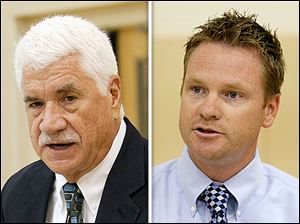
Board, TPS unions talk quietly
Repeat of 2011 acrimony not expected in new negotiations
5/10/2013
Jerome Pecko (L), outgoing Toledo Public Schools superintendent and Kevin Dalton, President of the Toledo Federation of Teachers.
Negotiations between the Toledo Board of Education and three Toledo Public Schools employee unions will likely be less dramatic than the last time the sides were at the bargaining table.
In 2011, major budget cuts were announced. Positions would be eliminated. Sweeping changes were proposed. Details of offers leaked. Negotiations ultimately fell apart, forcing a state mediator to step in. A new round of negotiations between the board and two TPS unions began quietly in recent days.
All have agreed not to negotiate in public, so there's no clear sense about what the district or unions want, but there's a sense among the parties that this time, things will move more smoothly.
“I would say the overall tone of negotiations are not what they were in 2011,” said Kevin Dalton, president of the Toledo Federation of Teachers.
The first tip there is a different atmosphere; the board hasn't brought in a hired gun. Cleveland attorney Craig Brown headed the district's team in 2011, and came under fire from both union officials and a school board member. This year, outgoing TPS Superintendent Jerome Pecko is heading negotiations, district leaders said.
While TPS will soon face budget deficits, there isn't the immediate need for cuts. That contrasts with 2011, when TPS officials said they needed $37 million in savings. Those cuts came mostly on the backs of employees, who accepted a 2.5 percent pay cut and increased health-care contributions.
Board President Brenda Hill said Thursday she would personally “love to give [employees] back some” pay they have given up in recent years, though she added budgets might make that impossible.
In 2011, Senate Bill 5, which would have restricted collective bargaining rights for public employees had it passed, galvanized union members who felt under attack. This year, a state requirement that student growth metrics be used in teacher and principal evaluations essentially resolves what has, in other places, led to heated battles between unions and schools.
The use of test score data in teacher evaluations was one of the disputes in last year's Chicago teacher strike, for instance. Whether the decision to mandate the type of data used for teacher evaluations was wise is another debate. Unions and TPS will still have to determine some of the mechanics of the system, but the most contentious issue is settled, right or wrong.
All the differences have led to a sense that agreements can be reached through collaboration, rather than dog fights.
“I think we are in a different climate,” said Don Yates, president of the Toledo Association of Administrative Personnel. “It's certainly more amicable.”
That labor and management appear more cordial at the negotiating table might not put all at ease, especially those who believe school staff are overpaid or that collective bargaining agreements stymied school reforms. But cordial doesn't necessarily mean either side won't drive a hard bargain.
Contracts for the Toledo Federation of Teachers, the Toledo Association of Administrative Personnel, and the American Federation of State, County, and Municipal Employees run out June 30. Negotiations with AFSCME workers have not started.
Contact Nolan Rosenkrans at: nrosenkrans@theblade.com, 419-724-6086, or on Twitter @NolanRosenkrans.